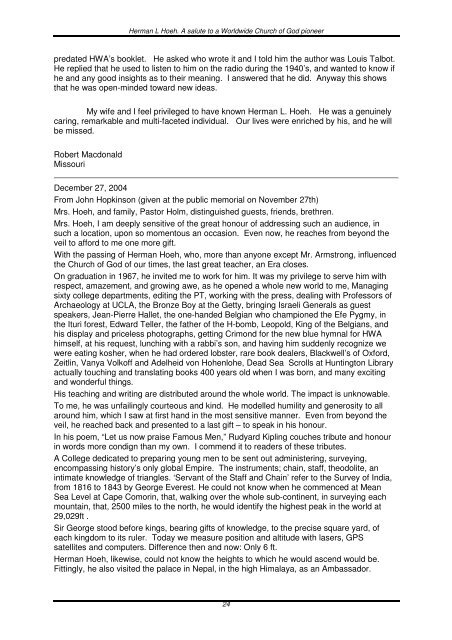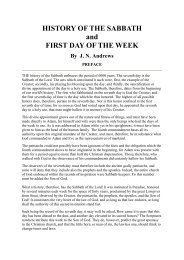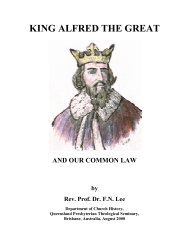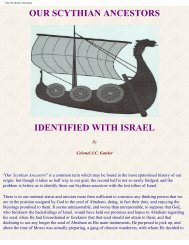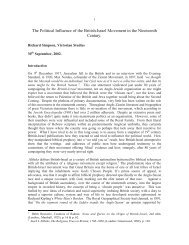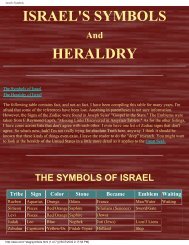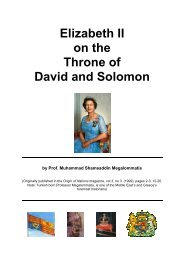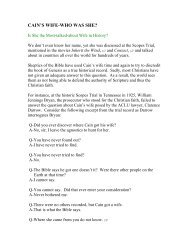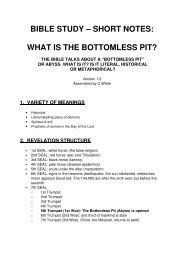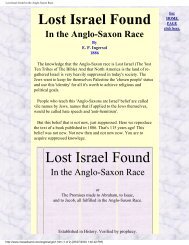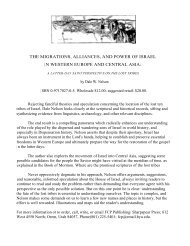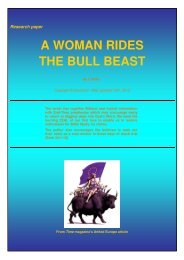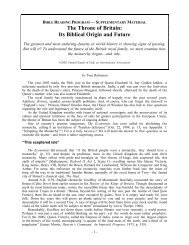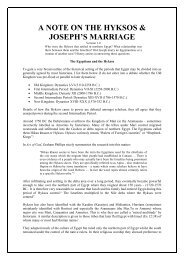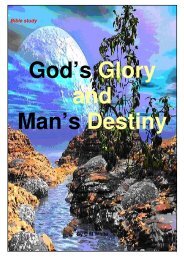Herman L Hoeh: Salute to a Pioneer (article - Origin of Nations
Herman L Hoeh: Salute to a Pioneer (article - Origin of Nations
Herman L Hoeh: Salute to a Pioneer (article - Origin of Nations
Create successful ePaper yourself
Turn your PDF publications into a flip-book with our unique Google optimized e-Paper software.
<strong>Herman</strong> L <strong>Hoeh</strong>. A salute <strong>to</strong> a Worldwide Church <strong>of</strong> God pioneer<br />
predated HWA’s booklet. He asked who wrote it and I <strong>to</strong>ld him the author was Louis Talbot.<br />
He replied that he used <strong>to</strong> listen <strong>to</strong> him on the radio during the 1940’s, and wanted <strong>to</strong> know if<br />
he and any good insights as <strong>to</strong> their meaning. I answered that he did. Anyway this shows<br />
that he was open-minded <strong>to</strong>ward new ideas.<br />
My wife and I feel privileged <strong>to</strong> have known <strong>Herman</strong> L. <strong>Hoeh</strong>. He was a genuinely<br />
caring, remarkable and multi-faceted individual. Our lives were enriched by his, and he will<br />
be missed.<br />
Robert Macdonald<br />
Missouri<br />
December 27, 2004<br />
From John Hopkinson (given at the public memorial on November 27th)<br />
Mrs. <strong>Hoeh</strong>, and family, Pas<strong>to</strong>r Holm, distinguished guests, friends, brethren.<br />
Mrs. <strong>Hoeh</strong>, I am deeply sensitive <strong>of</strong> the great honour <strong>of</strong> addressing such an audience, in<br />
such a location, upon so momen<strong>to</strong>us an occasion. Even now, he reaches from beyond the<br />
veil <strong>to</strong> afford <strong>to</strong> me one more gift.<br />
With the passing <strong>of</strong> <strong>Herman</strong> <strong>Hoeh</strong>, who, more than anyone except Mr. Armstrong, influenced<br />
the Church <strong>of</strong> God <strong>of</strong> our times, the last great teacher, an Era closes.<br />
On graduation in 1967, he invited me <strong>to</strong> work for him. It was my privilege <strong>to</strong> serve him with<br />
respect, amazement, and growing awe, as he opened a whole new world <strong>to</strong> me, Managing<br />
sixty college departments, editing the PT, working with the press, dealing with Pr<strong>of</strong>essors <strong>of</strong><br />
Archaeology at UCLA, the Bronze Boy at the Getty, bringing Israeli Generals as guest<br />
speakers, Jean-Pierre Hallet, the one-handed Belgian who championed the Efe Pygmy, in<br />
the Ituri forest, Edward Teller, the father <strong>of</strong> the H-bomb, Leopold, King <strong>of</strong> the Belgians, and<br />
his display and priceless pho<strong>to</strong>graphs, getting Crimond for the new blue hymnal for HWA<br />
himself, at his request, lunching with a rabbi’s son, and having him suddenly recognize we<br />
were eating kosher, when he had ordered lobster, rare book dealers, Blackwell’s <strong>of</strong> Oxford,<br />
Zeitlin, Vanya Volk<strong>of</strong>f and Adelheid von Hohenlohe, Dead Sea Scrolls at Hunting<strong>to</strong>n Library<br />
actually <strong>to</strong>uching and translating books 400 years old when I was born, and many exciting<br />
and wonderful things.<br />
His teaching and writing are distributed around the whole world. The impact is unknowable.<br />
To me, he was unfailingly courteous and kind. He modelled humility and generosity <strong>to</strong> all<br />
around him, which I saw at first hand in the most sensitive manner. Even from beyond the<br />
veil, he reached back and presented <strong>to</strong> a last gift – <strong>to</strong> speak in his honour.<br />
In his poem, “Let us now praise Famous Men,” Rudyard Kipling couches tribute and honour<br />
in words more condign than my own. I commend it <strong>to</strong> readers <strong>of</strong> these tributes.<br />
A College dedicated <strong>to</strong> preparing young men <strong>to</strong> be sent out administering, surveying,<br />
encompassing his<strong>to</strong>ry’s only global Empire. The instruments; chain, staff, theodolite, an<br />
intimate knowledge <strong>of</strong> triangles. ‘Servant <strong>of</strong> the Staff and Chain’ refer <strong>to</strong> the Survey <strong>of</strong> India,<br />
from 1816 <strong>to</strong> 1843 by George Everest. He could not know when he commenced at Mean<br />
Sea Level at Cape Comorin, that, walking over the whole sub-continent, in surveying each<br />
mountain, that, 2500 miles <strong>to</strong> the north, he would identify the highest peak in the world at<br />
29,029ft .<br />
Sir George s<strong>to</strong>od before kings, bearing gifts <strong>of</strong> knowledge, <strong>to</strong> the precise square yard, <strong>of</strong><br />
each kingdom <strong>to</strong> its ruler. Today we measure position and altitude with lasers, GPS<br />
satellites and computers. Difference then and now: Only 6 ft.<br />
<strong>Herman</strong> <strong>Hoeh</strong>, likewise, could not know the heights <strong>to</strong> which he would ascend would be.<br />
Fittingly, he also visited the palace in Nepal, in the high Himalaya, as an Ambassador.<br />
24


